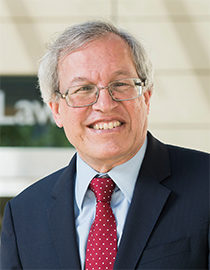
President Donald Trump and some of his supporters are challenging the traditional system of checks and balances that have preserved constitutional order in the United States, says Erwin Chemerinsky, dean of the UC Berkeley School of Law. (Flickr photo by Gage Skidmore licensed under CC BY-SA 2.0)
As the impeachment of President Donald Trump moved through the U.S. House of Representatives, and now moves through the Senate, his defenders frequently cast it as a political process seeking to cause political damage. Some outspoken partisans have sought to discredit the entire process as “political theater” and a “political circus.”
Erwin Chemerinsky, dean of the UC Berkeley School of Law and an eminent constitutional law scholar, doesn’t dispute that the process is political. But in an interview with Berkeley News , Chemerinsky said that when that argument is carried too far, it can pose significant threats to the health of the constitutional system.
“The Constitution is based on checks and balances,” he said. “But if the president can’t be criminally prosecuted, if the president can’t be subpoenaed, if Congress can’t investigate, if impeachment is toothless—what are the checks and balances we’re left with?”
Other arguments made by Trump’s impeachment defense team are “frightening,” he said, and essentially could place the president above the law.
Berkeley News: How do you respond to those who criticize the impeachment process as political? Isn’t it a legal process as well?
Erwin Chemerinsky: Inherently impeachment is both legal and political. It’s legal in that the Constitution prescribes a legal standard and sets up procedures for impeachment and removal. But it’s political in the sense that it’s voted on by a body — the Congress of the United States, and the House and Senate within it — that are inherently political.
Does it undermine Constitutional health, undermine the legal system, if a party in this process paints it entirely as a political process?
I think painting it as an entirely political process is inaccurate generally and wrong in terms of the facts of this situation. It’s inaccurate generally because there is a constitutional standard for removing a president from office — treason, bribery or other high crimes and misdemeanors. And we can have a legal discussion about whether that standard is met.
It frightens me, the position that you can only impeach for a crime, and not for abuse of power, because then we have no check on abuse of power.”
It’s also wrong in this case to say it’s just political. There’s no dispute with the basic facts. President Trump used his office to try to help his re-election at the expense of Joe Biden. He refused to comply and instructed all of his aides to refuse to comply with any subpoenas. Now the question is: Does that constitute high crimes and misdemeanors? But that’s not just a political question.
One of the positions we hear is: This is just an effort to undo the 2016 election. Any impeachment by definition is removing somebody who was elected. Any impeachment could be opposed on the grounds that it’s removing somebody who was elected under the law. But that shouldn’t rob it of legitimacy.
Another of the arguments that was made was, you shouldn’t be able to remove a president in an election year. That’s not what the Constitution says. It could have. It could have said: You can impeach a president, but not in an election year. Andrew Johnson was impeached in 1868, an election year.
As this process is unfolding, do you see implications for the strength of the constitutional system?
I think there are enormous implications for the Constitution. The Constitution is based on checks and balances. But if the president can’t be criminally prosecuted, if the president can’t be subpoenaed, if Congress can’t investigate, if impeachment is toothless — what are the checks and balances we’re left with?
If Madison, Hamilton and their colleagues were alive today, how would they view this?
The framers did not like the idea of political parties, and did not want there to be political parties. But they quickly developed. I think they would say: “We were right. Political parties are responsible for this problem.”
What did they want, if not parties?
They worried very much about political parties. And I think if there had to be political parties, they would have wanted a multiplicity of them. But what we’re seeing now is the fruition of having two political parties. And the lesson to any president now is that, so long as your party sticks with you, you don’t have to worry about impeachment and removal from office.
You’re watching the impeachment process through a particular lens — that of a scholar in constitutional law. What engages or intrigues you? What worries you?
Some of what worries me are some of the arguments that are being made by Trump’s defenders. Alan Dershowitz made a statement Wednesday morning that basically said: Any president thinks that his election or reelection is in the public interest.
So anything the president does is in the public interest. And to me that’s a very frightening statement. It says that a president could violate any criminal law, abuse any power and say, ‘It’s in the public interest because it will help me get elected and my election is good for the country.’
It frightens me, the position that you can only impeach for a crime, and not for abuse of power, because then we have no check on abuse of power.
And so I’ve been paying a lot of attention to: What’s the Republican rhetoric? What’s the Republican argument? Because, to the extent they’re going to be viewed as victors in this process, is that going to be the precedent for the future?


